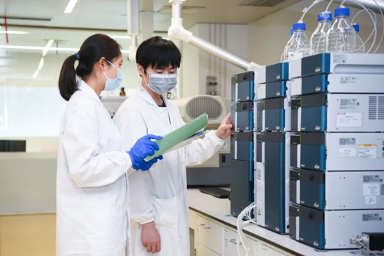The marketing application for new indications of Anrotinib hydrochloride capsule and anti-PD-L1 “Behmosubaisumab (TQB2450 injection)” of Zhengda Tianqing has been accepted.
March 2, 2024
Source: drugdu
 540
540
 Recently, Anrotinib Hydrochloride Capsules and anti-PD-L1 "Behmosubaisumab (TQB2450 Injection)" developed by Zhengda Tianqing have submitted a new indication application to the Center for Drug Evaluation of the State Drug Administration (CDE), which has been accepted, with the indications of non-microsatellite patients who have previously failed to receive or cannot tolerate the first- or second-line chemotherapy regimens. Recurrent or metastatic endometrial cancer that is not microsatellite highly unstable (non-MSI-H) or non-DNA mismatch repair defective (non-dMMR), or intolerant.
Recently, Anrotinib Hydrochloride Capsules and anti-PD-L1 "Behmosubaisumab (TQB2450 Injection)" developed by Zhengda Tianqing have submitted a new indication application to the Center for Drug Evaluation of the State Drug Administration (CDE), which has been accepted, with the indications of non-microsatellite patients who have previously failed to receive or cannot tolerate the first- or second-line chemotherapy regimens. Recurrent or metastatic endometrial cancer that is not microsatellite highly unstable (non-MSI-H) or non-DNA mismatch repair defective (non-dMMR), or intolerant.
Bemosumab is an innovative, fully humanized anti-PD-L1 monoclonal antibody with a new sequence developed by AstraZeneca.In April 2022, Bemosumab in combination with amrutinib hydrochloride capsules for the treatment of recurrent or metastatic endometrial cancer was included in the Breakthrough Therapeutic Classification by the CDE.In January 2023, Bemosumab's application for marketing in the first-line treatment of recurrent or metastatic endometrial cancer in combination with amrutinib hydrochloride capsules was formally accepted by the CDE.The application was approved by the CDE. In January 2024, bemosuzumab in combination with amlotinib hydrochloride capsules for the treatment of recurrent or metastatic endometrial cancer was included in the CDE's priority review and approval program.
Anrotinib hydrochloride capsule is an oral novel small molecule multi-targeted tyrosine kinase inhibitor (TKI) independently developed by Astronergy.In May 2018, Anrotinib hydrochloride capsule was approved for marketing by the State Drug Administration (SDA) and was the first drug approved for the third-line treatment of advanced non-small-cell lung cancer in China.In January 2023, the marketing application for the sixth indication of Anrotinib hydrochloride capsule was formally accepted by CDE for the first-line treatment of small cell lung cancer in combination with bemosuzumab.Previously, amlotinib hydrochloride capsules have been approved for five indications in China: third-line non-small cell lung cancer, third-line small cell lung cancer, soft-tissue sarcoma, medullary thyroid carcinoma and differentiated thyroid cancer.
Endometrial cancer ranks second among malignant tumors of the female reproductive system in China and first in developed countries. With the increasing prevalence of high-fat and high-calorie dietary patterns and the gradual spread of unhealthy lifestyles, the incidence of endometrial cancer has been increasing, especially in China, with an obvious trend of youthfulness.In 2016, the number of new cases of endometrial cancer in China reached 71,000, with an incidence rate of 10.54 per 100,000 people. Currently, the first-line therapy for endometrial cancer in China is platinum-containing chemotherapy, but there is no standard clinical treatment plan for patients who have progressed after the first-line treatment, and patients have limited clinical treatment options and poor prognosis, which urgently require effective treatment modalities.
Behmosuzumab in combination with Anrotinib hydrochloride capsules may bring new treatment hope for endometrial cancer patients, and is expected to be the first PD-L1 inhibitor and small molecule anti-angiogenic drug combination therapy approved for recurrent or metastatic endometrial cancer in China, solving the clinical needs that have not yet been met, and benefiting the patients in China. At the same time, it also marks the successful layout of Behmosubaisumab in another important field after small cell lung cancer. In addition, Behmosubaisumab combined with Anrotinib Hydrochloride Capsules is undergoing a number of clinical phase III trials, including first-line renal cancer, first-line non-small cell lung cancer, and maintenance after radiotherapy and chemotherapy for non-small cell lung cancer. The Company will continue to promote the development of bemosubicinumab and amrutinib hydrochloride capsules to bring new treatment options to more patients.
https://mp.weixin.qq.com/s/2RHj01NFhXOJLYAd_EcJSw
Read more on
- Gusekirumab Injection Accepted by CDE, Multiple Pipelines Advancing Simultaneously March 4, 2026
- Yifan Pharmaceutical’s teriparatide injection has been accepted by the CDE (Center for Drug Evaluation), adding a new domestic player to the osteoporosis treatment field March 4, 2026
- //news.yaozh.com/archive/47318.html PD-1 sales surge March 4, 2026
- A major breakthrough! Roche’s oral BTK inhibitor achieves its third Phase III clinical trial victory, a game-changer in the multi-billion dollar MS (manufactured pharmaceuticals) market. March 4, 2026
- GB19 Injection Approved for Clinical Trials of Cutaneous Lupus Erythematosus March 4, 2026
your submission has already been received.
OK
Subscribe
Please enter a valid Email address!
Submit
The most relevant industry news & insight will be sent to you every two weeks.



